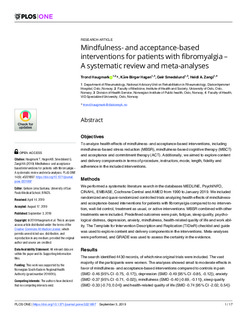Mindfulness- and acceptance-based interventions for patients with fibromyalgia - A systematic review and meta-analyses.
Peer reviewed, Journal article
Published version
Permanent lenke
http://hdl.handle.net/11250/2633478Utgivelsesdato
2019Metadata
Vis full innførselSamlinger
- Artikler [5068]
- Publikasjoner fra CRIStin FHI [7544]
Sammendrag
Objectives To analyze health effects of mindfulness- and acceptance-based interventions, including mindfulness-based stress reduction (MBSR), mindfulness-based cognitive therapy (MBCT) and acceptance and commitment therapy (ACT). Additionally, we aimed to explore content and delivery components in terms of procedure, instructors, mode, length, fidelity and adherence in the included interventions. Methods We performed a systematic literature search in the databases MEDLINE, PsychINFO, CINAHL, EMBASE, Cochrane Central and AMED from 1990 to January 2019. We included randomized and quasi-randomized controlled trials analyzing health effects of mindfulness- and acceptance-based interventions for patients with fibromyalgia compared to no intervention, wait-list control, treatment as usual, or active interventions. MBSR combined with other treatments were included. Predefined outcomes were pain, fatigue, sleep quality, psychological distress, depression, anxiety, mindfulness, health-related quality of life and work ability. The Template for Intervention Description and Replication (TIDieR) checklist and guide was used to explore content and delivery components in the interventions. Meta-analyses were performed, and GRADE was used to assess the certainty in the evidence. Results The search identified 4430 records, of which nine original trials were included. The vast majority of the participants were women. The analyses showed small to moderate effects in favor of mindfulness- and acceptance-based interventions compared to controls in pain (SMD -0.46 [95% CI -0.75, -0.17]), depression (SMD -0.49 [95% CI -0.85, -0.12]), anxiety (SMD -0.37 [95% CI -0.71, -0.02]), mindfulness (SMD -0.40 [-0.69, -0.11]), sleep quality (SMD -0.33 [-0.70, 0.04]) and health-related quality of life (SMD -0.74 [95% CI -2.02, 0.54]) at end of treatment. The effects are uncertain due to individual study limitations, inconsistent results and imprecision. Conclusion Health effects of mindfulness- and acceptance-based interventions for patients with fibromyalgia are promising but uncertain. Future trials should consider investigating whether strategies to improve adherence and fidelity of mindfulness- and acceptance-based interventions can improve health outcomes.
